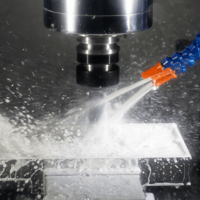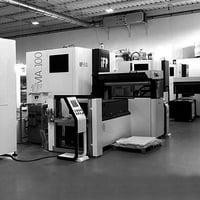Are You Using the Right Chemistry When Cleaning Your Parts?
Choosing the right washing chemistry is important when trying to remove all the water, oils and processing waste from a finished part. In most plants, the ideal end goal would be the ability to effectively clean parts made in oil and/or water, but what parts-washing chemistry works best? Some factors you might consider when choosing your parts washing system include the fluid used in your cutting machine, state and federal EPA standards, and the cost of maintaining your parts washer.
Your cutting fluid determines the most consistent parts-washing chemistry.
What cutting fluids are you using in your machining process? Water-based coolants, such as those used in machining centers, conventional lathes, and many grinders, can easily be captured and rinsed away with water-based chemistries. If your cutting fluids are primarily water-based, an aqueous parts washer may be a good fit.
 What about oil? If you’re machining parts in a Swiss lathe or another multi-spindle lathe, a forming/stamping machine, or various grinding/honing machines, the cutting fluid is likely oil. It’s an indisputable fact that nothing removes oil part soils better than solvent. Water and oil do not mix, simply because water is polar, and oil is non-polar. Therefore, water-based chemistries must be added to the water to capture the oil so it can be rinsed away. Differing part materials may demand different chemistries, so unless you’re willing to spend more time supervising the wash cycles, you will be better off with a parts washer specifically designed for cleaning oil-coated parts.
What about oil? If you’re machining parts in a Swiss lathe or another multi-spindle lathe, a forming/stamping machine, or various grinding/honing machines, the cutting fluid is likely oil. It’s an indisputable fact that nothing removes oil part soils better than solvent. Water and oil do not mix, simply because water is polar, and oil is non-polar. Therefore, water-based chemistries must be added to the water to capture the oil so it can be rinsed away. Differing part materials may demand different chemistries, so unless you’re willing to spend more time supervising the wash cycles, you will be better off with a parts washer specifically designed for cleaning oil-coated parts.
If your process involves oil and water-based coolants, you may want to consider a compound capable of effectively cleaning both. Modified alcohol is water-free and an effective solvent with excellent cleaning power, containing both polar and non-polar properties.
Are you restricted by state and federal EPA standards?
Vapor degreasers release fumes to clean the parts, and solvent fumes and solvent handling can be a hazardous business, which is what led to growing EPA regulations and restrictions on chemicals in the workplace.
 As companies compromised by switching to aqueous systems, they discovered the added cost and effort related to the monitoring, mixing, and disposal of consumable chemistry. Others, preferring the advantages of solvent, switched to less hazardous chemicals but found the cost for these “green” alternatives to be excessive.
As companies compromised by switching to aqueous systems, they discovered the added cost and effort related to the monitoring, mixing, and disposal of consumable chemistry. Others, preferring the advantages of solvent, switched to less hazardous chemicals but found the cost for these “green” alternatives to be excessive.
Another choice is using modified alcohol in a vacuum. A self-contained vacuum parts washer coupled with modified alcohol, such as KYZEN’s Metalnox M6386, will eliminate concerns brought forth by conventional vapor degreasers using hazardous or expensive chemistry and minimize solvent consumption through continual fresh solvent regeneration.
Some states may regulate your water consumption, making an aqueous washer less than ideal. iFP and KYZEN make a great team that can eliminate the use of water and all the related troubles it brings.
Washing parts with the wrong chemistries will cost more than just money.
When choosing a new washer, your goal should be to limit or eliminate your recurring costs, such as the cost of water or solvent, the cost to condition hard water, energy costs, costs of washing consumables and labor costs in regards to monitoring, mixing and changing chemistry.

As mentioned earlier, aqueous parts washing is not fully effective in capturing oil-based soils without the use of added chemistries. If you require multiple different cleaning agents to account for differing part materials, extra time will be needed to monitor the cleaning process, change out the chemistries, and keep the ratio constant. Since oil will quickly saturate these chemistries, someone will need to consistently skim the residue off the water and dispose of it properly. You also must watch out for scum buildup on aqueous washers.
Deciding between aqueous or solvent-based technology isn’t the only factor involved in choosing the right parts washer. Washing challenging parts and accounting for bulk loads may also be important details in your operation. If you want to know how iFP can improve your parts washing process, speak with an iFP representative today!

